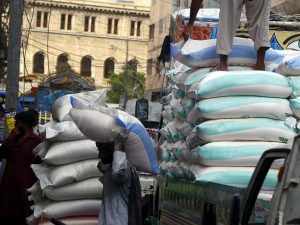Without quick intervention from the government, flour prices will soar upward.
As a result of surplus demand, retailers have been exploiting pricing structures, much to the dismay of the general populace.

PESHAWAR, KARACHI, and LAHORE: The political unpredictability has caused economic instability, making it a difficult year for the poor and middle class. If the current economic catastrophe continues, the future year won’t be any better either.
The high price of flour is the main issue facing the general public right now, and if supply problems are not resolved and efficient price control mechanisms are not put in place, prices will continue to rise in 2023.
According to a market study done by the Express Tribune, general retailers are currently selling a 5 kilogramme (kg) bag of flour in Karachi for anywhere between Rs 600 and Rs 750. Similar to this, a 10 kg bag of flour retails for roughly Rs 800 in Lahore, where it is typically sold in 10, 15, and 20 kg bags, despite a Rs 200 billion provincial government subsidy on flour.
A bag of flour weighing 8 kg costs Rs. 1,500 in Peshawar, whereas a bag weighing 20 kg costs Rs. 2,700. As a result, local tandoors in Karachi and Lahore now charge Rs. 18 for a roti and Rs. 25 for a naan; in contrast, the owners of the ovens in Peshawar charge anywhere from Rs. 20 to Rs. 40 for roti and naan. The rise in flour and bread costs has alarmed the public, who believe that the government hasn’t done enough to combat double-digit inflation or provide assistance in these trying times. “Buying a sack of flour has become a fantasy for people who make a daily wage,” bemoaned Babar, a local of Karachi’s Kala Pul neighbourhood.
He believed that the rate of price increases will soon turn roti into a luxury food only for the wealthy.
Farkhunda Shehzad, a local of Karachi’s Surjani Town neighbourhood, agreed with Babar and claimed that even the province government’s cheap flour programme was useless for them. “The supply of flour sacks provided by the government cannot keep up with the demand. Therefore, we are forced to purchase pricey flour from the neighbourhood shops,” stated Shehzad. Similar to this, Sajid Khan, a resident of Lahore, believed that the government had failed on numerous fronts due to the fact that people were struggling to provide for their families as a result of their poor administration. Shahid Aslam, a teacher by profession who also lives in the city, agreed with Khan that it had grown difficult to get by on a modest income.
If the government is unable to help us in any other way, Aslam complained, “it could at least apply some price control mechanisms to make flour cheaper.” Even though it is unclear whether any price control measures will be put in place, Farid Qureshi, secretary of the Karachi Retailer Grocers Association, said that bad governance was to blame for the spike in flour costs. There is a significant imbalance between supply and demand, which some shops are taking advantage of, but the government has not addressed this problem, said Qureshi. Chaudhry Aamir, the chairman of the Pakistan Flour Mills Association Sindh, also put the initiative in the hands of the executive branch. “The government controls 90% of the wheat stock, but certain hoarders are selling it illegally and then driving up the price daily. He recommended that the government commence a crackdown on these individuals. Aamir added that the government should permit the private sector to import wheat and create a comprehensive plan to manage the wheat shortage if it were to avoid a disaster. Syed Imdad Shah, the director of the provincial food department, thinks that the administration was making every effort. In bachat bazaars and other locations across Karachi, we already offer flour at low prices, according to Shah.
He continued, “On the other hand, the higher prices at retailers fall under the district administration’s domain and they should look into it.
Shahzeb Saeed, Punjab’s Director of Food, shares Shah’s sentiments. “A 20 kilogramme bag of flour costs Rs 1,295 because the government has already provided a subsidy on it. We are doing everything we can to assist the general public, Saeed told the Express Tribune.










































